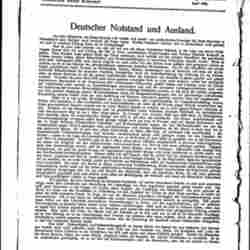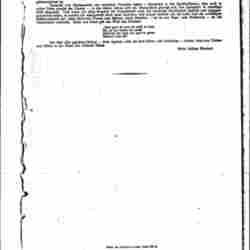The page(s) below need to be transcribed and/or reviewed. Click the button to the right of a page to transcribe or review the text’s transcription.
For transcription tips and more information about transcribing documents in the Jane Addams Digital Edition, please visit About Transcribing.


German State of Emergency and Foreign Countries.
Every Red Cross employee is approached again and again by foreign friends during their visits to Germany or even more frequently by letter with the question: What emergencies still arise in Germany, where and to what extent do they occur?
Now, each and every one of us who are concerned with these emergencies is able to provide information on the nature and scope of the emergency in its various manifestations and forms at any time based on our own experience. To the foreign eye, however, the misery remains hidden, veiled by the calm surface of the orderly life of our people whose persistence and resilience has been tested in the most difficult trials. If, despite all hidden hardships, it is still possible to keep up the appearance of a calm and orderly life on the surface, it is the result of decades of thrifty German economy. The solid shapes of apartments, gardens, streets, city facilities and reserves created for public and private life, such as the proverbial linen closet of the German housewife, still enable the preservation of order down to the smallest detail. Despite the fact that the years 1914/1918 led our already predisposed to thriftiness people to an even greater thriftiness in the utilization of all available resources which had previously seemed almost impossible and yet under the influence of circumstances each individual was forced to make limitations and the thrifty lifestyle habits have been maintained to a large extent even after the lifting of the formal economic blockade, thus since then the progressive burden on our economic life due to reparations and the simultaneous international devaluation of our money has not only made it impossible to replenish the reserves, but has almost used them up.
It is of great importance to keep in mind [that] comparatively the overall standard of living of our people, especially in the large cities and industrial areas, deteriorated by more than 60 percent around 1913/14. This fundamental fact needs to be shown only by one example to be recognizable in its full seriousness. Let us take the monthly income on 1. March this year of a hardworking aide in business life who works as an accountant or stenotypist. It ranged between 1500 and 2000 marks as the upper limit and therefore exceeded the corresponding salaries from 1913/14 by about twelve times. The tax, health insurance and insurance deductions reduce even this low salary by about 15 percent and with this income the person in question [has to] bear maintenance and housing costs which, according to the country index number, increased almost twenty times around 1913/14, and clothing and other expenses, which are 30-50 times as high as in these same years. Therefore such a workforce, whether man or woman, whether married or unmarried, – the corresponding marriage allowances are either negligible or barely sufficient to support the children – is hardly able to shape even 40 percent of the lifestyle to the extent that the income of 1913/14 allows it. There is no doubt that on 1. March of this year there were salaries, mainly in certain industrial areas in which a comparison with the corresponding labor incomes from 1913/14 is somewhat more favorable. On the other hand, however, it must be considered that the so-called fixed salaries, be it pensions, old-age pensions or other fixed incomes, as well as the whole group of the so-called elevated salaries did not increase approximately as much as the average earned income. This explains the fact [that] the majority of the German population is in a state of emergency, not only relatively, but also absolutely compared to 1913/14 since the possibility of creating reserves of any kind does not exist for them, especially since the income today is not sufficient to satisfy even the most modest special needs. The unfortunately increasing inflation from month to month naturally pushes this poor way of living even further down to an increasingly dangerous level of deprivation. First the cultural values, intellectual and social stimuli of all kinds, disappear out of the realm of possibility, then the domestic values based on a certain comfort and finally even the satisfaction of the need and thus the physical health and productivity are often questioned.
We believe [that] a discussion of the German emergencies, no matter which particular areas it may cover, [must] under all circumstances be based on a consideration of the overall situation as indicated above. This is especially true in the case of Catholic Charities, whose mission has always been “the alleviation of emergencies”. When we speak today of emergencies in connection with the duties of Catholic Charities in the old sense, we have in mind the cases of the most blatant misery which still stand out from the general meagerness of the overall way of life. Whether these are institutions or other charitable establishments, it does not matter. The fact that precisely these, previously maintained by the [abundance] enterprises, have to struggle with unforeseen difficulties in times like the present, does not need to be explained further. But even there in earlier times, if one may say so, treasures have been accumulated, which sometimes [keep] on the surface the appearance of a successful leadership. But behind the doors and the cabinets of the houses it is empty and all too often the financial basis, be it a foundation, be it the support of a group of benefactors or something else, is undermined by the above-mentioned exhaustion of our entire economic life and the disruption of the purchasing power of our currency, so that the buildings are threatened with collapse.
Who helps? The willingness to make sacrifices and the instinct for self-preservation within lead the struggle to the extreme and could not stop the decline if they did not receive help from abroad from those who [let] sympathy or love for Germany give in-depth look into the conditions and to whom this insight is granted. Even the Red Cross staff has the serious obligation to convey the knowledge of the actual situation to as many as possible. It is [essentially] irrelevant whether it is the need of the hospitals or the nursing homes, or the most heartbreaking [page 2] – because it is entirely not their fault – plight of the children as it is now, for example, again in the 3rd yearly report of the German Red Cross on the “milk supply and probable number of tuberculous, sick and malnourished children in German cities with over 100,000 inhabitants” which is so alarming that one [lets] distant people take a look, as long as only the general emergency is reasonably labelled as a gloomy indicator.
Thousands and thousands of tried and tested friends – especially in neighboring countries, but also in many places across the ocean – have taken care of Germany in recent years and turned their sympathy into practical help. And even when we have welcomed and received these testimonies of friendship with heartfelt gratitude, we are naturally touched even more heartily and deeply by the love and active helpfulness of the many millions of men and women whose lifeblood – be it on their father’s or mother’s side – connects them with Germany. For the word of the poet applies to them:
"God gave all men all earth to love, But as our hearts are small Ordained for each one spot to prove Beloved over all."
To their most beloved homeland – their own, or that of their parents or ancestors – her daughters and sons extend their helping hand in the distance.
Otto Julius Merkel.








Comments